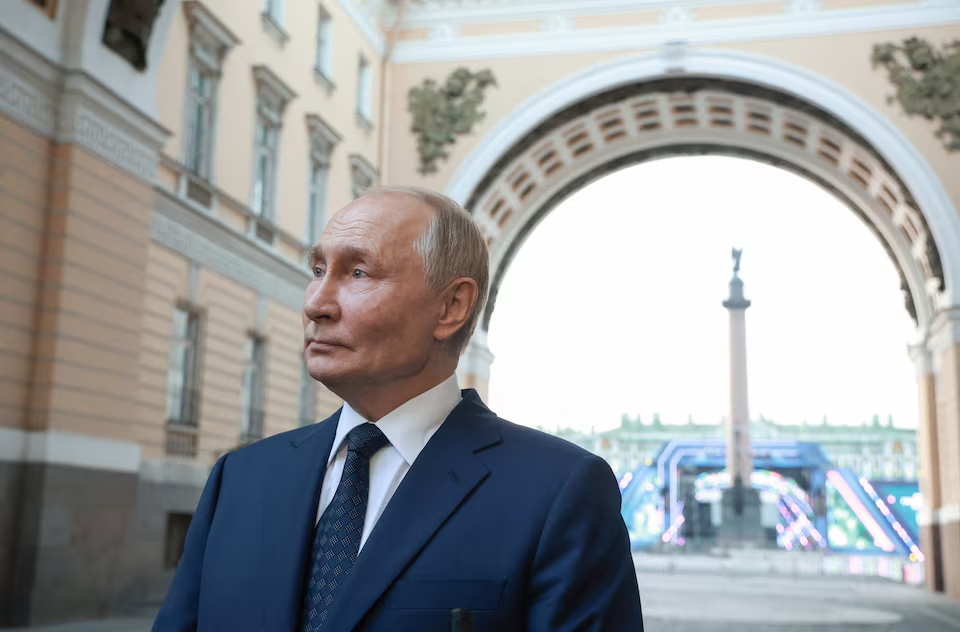Russian officials and managers are perplexed by President Vladimir Putin’s surprise threat to limit exports of strategic commodities in response to Western sanctions, and wonder if it can be realised without hurting Russia more than the West.
Putin made the suggestion 23 minutes into a routine government meeting on Wednesday, asking Prime Minister Mikhail Mishustin to come up with some ideas that would not harm Russia’s interests.
Yet many of Russia’s commodities such as oil, gas, nickel, titanium, gold and diamonds are already subject to various levels of voluntary or mandatory import restrictions or even bans imposed by the West itself.
Russian government officials and company executives were caught off guard.
“Everyone is in a state of shock,” said a source in one of the affected companies, who spoke on condition of anonymity due to the sensitivity of appearing to criticise the president. “This initiative came really out of the blue.”
Another company source said: “It’s like shooting yourself in the foot.”
Cutting exports of uranium, nickel and titanium – which Putin mentioned explicitly – would cut the foreign currency earnings of Russia’s biggest firms including state-owned industrial conglomerate Rostec, state nuclear monopoly Rosatom and Nornickel, the world’s top producer of refined nickel.
Together, they employ about a million people, and their revenues have already been affected by Western sanctions.
Nornickel’s (GMKN.MM), opens new tab first-half profit fell by 22% as it tries to pivot its exports to Asia. It has described the combination of low nickel prices and Western sanctions as a “perfect storm”.
The global market price of nickel did blip upwards on Putin’s comments – but the current wealth of supply means it is far below historic highs.
A Russian government source, who also spoke on condition of anonymity, said any ban should spare so-called “friendly” countries including China, Russia’s major trading partner.
URANIUM RESTRICTIONS COULD HURT WEST
The source stressed that it would take some time for the government to develop the plan – and that an order from the president to do so had yet to reach the government.
Another source close to the government added that Putin had “asked for a plan to be worked out, not implemented”.
Major Russian commodities producers declined to comment.
Russia and the West are entering a new level of confrontation over the Ukraine war and Russia is pondering ways to respond to what it says is almost certain Western approval for Ukraine to strike deep into Russia using Western weapons.
Putin said that if Russia went ahead, the measure would not be limited to uranium, nickel and titanium. He noted that Russia has 22% of the world’s natural gas reserves, 23% of gold reserves, and 55% of global diamond reserves.
Uranium may be the one commodity where restrictions could genuinely hurt the West.
Russia accounted for 27% of the enriched uranium supplied to U.S. commercial nuclear reactors last year. While the U.S. has in theory banned imports of the fuel from Russia, it also provided for waivers through 2027 as it expands its own enrichment facilities.
Yet Europe has largely weaned itself off the Russian gas it used to depend on. Group of Seven and European Union bans on imports of Russian-origin diamonds forced Moscow to buy up diamonds from its sanctions-hit producer, Alrosa (ALRS.MM), opens new tab. And all Russia’s major gold producers are already under Western sanctions.
Meanwhile, Russia’s largest titanium sponge maker VSMPO-AVISMA, partly owned by Rostec, has been struggling to find replacements for supplies of titanium concentrate from Ukraine, with which Russia is at war.
Putin himself emphasised that restrictions would not happen “tomorrow”, and that they must not harm Russia’s interests.
On Friday, Kremlin spokesman Dmitry Peskov stressed the as-yet hypothetical nature of the idea.
“There are no specifics yet, it was a proposal to think about it without harming ourselves, without damaging our own interests,” he said. “They (the government) will consider it.”
Source: Reuters


